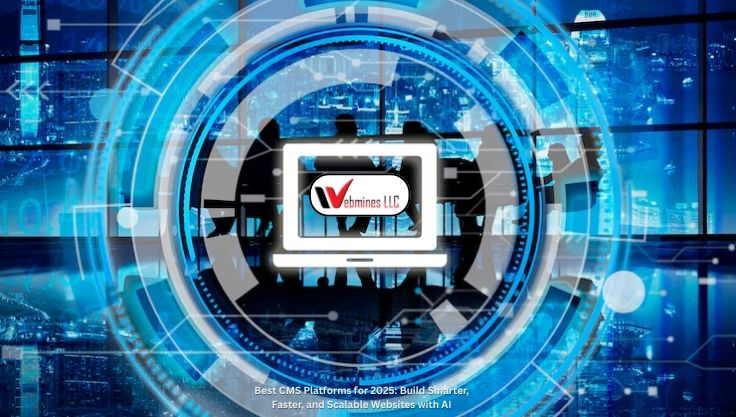Digital Trends: Navigating the Future of Technology and Innovation
Stay ahead of the curve with the latest digital trends. Explore emerging technologies, innovative digital strategies, and trends that will shape the future of business and consumer behavior.

Introduction:
The digital landscape is continuously evolving, and staying updated with the latest trends is essential for businesses and individuals who want to stay competitive. As we move further into the 21st century, new technologies are emerging, transforming industries, and reshaping the way we work, interact, and live. From AI and automation to blockchain and the Internet of Things (IoT), digital trends are paving the way for the future of technology and innovation. This blog dives into the most significant digital trends that are set to impact the world in the coming years.
1. Artificial Intelligence and Machine Learning
Artificial intelligence (AI) and machine learning (ML) continue to lead the way as dominant forces in digital transformation. These technologies are revolutionizing everything from customer service to marketing, data analysis, and beyond.
-
AI-Powered Automation: Automation driven by AI allows businesses to streamline processes, enhance decision-making, and create personalized user experiences. Machine learning algorithms can analyze vast amounts of data to identify patterns and make predictions, optimizing workflows across various sectors, including finance, healthcare, and retail.
-
Natural Language Processing (NLP): NLP, a subset of AI, is enabling machines to understand and process human language. Virtual assistants, chatbots, and voice recognition tools are enhancing customer interactions, making services more efficient and user-friendly.
-
AI in Marketing: AI is increasingly used in digital marketing strategies to predict customer behavior, personalize content, and optimize ad targeting. With AI’s predictive capabilities, businesses can deliver highly tailored marketing campaigns that increase conversion rates.
2. Internet of Things (IoT)
The Internet of Things refers to the network of connected devices that communicate and share data with each other over the internet. IoT is transforming industries such as healthcare, manufacturing, and transportation by providing real-time insights and improving operational efficiency.
-
Smart Homes and Cities: IoT enables smart devices in homes, such as thermostats, lights, and security cameras, to communicate with each other for a more connected and automated lifestyle. Smart cities use IoT technology to improve infrastructure, reduce energy consumption, and enhance urban living.
-
IoT in Healthcare: In the healthcare industry, IoT devices are used for remote patient monitoring, wearables, and smart medical equipment, allowing for better management of chronic conditions and real-time health tracking.
-
Supply Chain and Manufacturing: IoT technology is also driving efficiencies in supply chain management by providing real-time tracking of goods and materials, enabling businesses to predict demand and optimize inventory levels.
3. Blockchain Technology
Blockchain technology, most commonly associated with cryptocurrencies like Bitcoin, is gaining widespread adoption across various industries due to its ability to provide secure, transparent, and decentralized solutions.
-
Decentralized Finance (DeFi): Blockchain is playing a pivotal role in the growth of decentralized finance, eliminating the need for intermediaries like banks and enabling peer-to-peer transactions. With blockchain’s secure and transparent nature, financial services such as lending, borrowing, and trading are becoming more accessible and efficient.
-
Smart Contracts: Smart contracts are self-executing contracts with the terms of the agreement directly written into code. Blockchain allows for the creation of tamper-proof, automated contracts, which can revolutionize sectors like real estate, insurance, and supply chain management by increasing trust and reducing fraud.
-
Blockchain in Supply Chain Management: Blockchain technology provides real-time tracking and visibility of goods, ensuring transparency and security throughout the supply chain. This makes it easier to verify product origins and prevent counterfeiting.
4. 5G Technology
5G is the next generation of mobile networks, offering faster speeds, lower latency, and greater connectivity than its predecessors. This technology will have a profound impact on industries, including telecommunications, healthcare, and entertainment.
-
Faster Connectivity: 5G promises to enable ultra-fast data transfer speeds, which will enhance video streaming, gaming, and IoT applications. This will also support the growing demand for high-bandwidth applications like virtual and augmented reality (VR/AR).
-
IoT and Smart Cities: With 5G’s increased connectivity, smart cities and IoT devices will benefit from faster data transfer and more reliable communication between connected devices, enabling more efficient urban management.
-
Healthcare Innovation: 5G can enable real-time remote medical procedures and consultations, improving healthcare accessibility and patient care. It will also support the development of advanced health monitoring devices and AI-assisted diagnostics.
5. Augmented Reality (AR) and Virtual Reality (VR)
Augmented reality and virtual reality are revolutionizing how businesses engage with customers, offering immersive experiences that were previously unimaginable.
-
AR in Retail: Augmented reality is transforming the retail industry by allowing customers to try on clothes virtually or visualize how furniture would look in their homes before making a purchase. AR provides an interactive and personalized shopping experience.
-
VR in Training and Education: Virtual reality is increasingly being used in training and educational programs, offering immersive learning experiences for students and employees. VR allows for hands-on training in a safe, virtual environment, which is particularly valuable in industries like healthcare and manufacturing.
-
Gaming and Entertainment: AR and VR are transforming the gaming and entertainment industries by creating more immersive and interactive experiences. As technology advances, these trends will continue to shape the way we consume media.
6. Cloud Computing and Edge Computing
Cloud computing has been a game-changer for businesses, providing scalable, on-demand access to computing resources. However, edge computing, which brings computing power closer to the data source, is emerging as a key trend for faster data processing.
-
Cloud Computing: Businesses are increasingly adopting cloud-based solutions for storage, collaboration, and software-as-a-service (SaaS) applications. The cloud offers flexibility, cost-efficiency, and scalability, making it easier for companies to manage data and infrastructure remotely.
-
Edge Computing: As more devices connect to the internet, edge computing allows data to be processed closer to the source, reducing latency and enabling real-time decision-making. Edge computing will play a crucial role in IoT applications, autonomous vehicles, and 5G networks.
7. Cybersecurity
With the increasing reliance on digital technology, cybersecurity is more important than ever. Businesses must ensure that their data and digital systems are protected against cyber threats, including hacking, ransomware, and data breaches.
-
AI in Cybersecurity: AI and machine learning are being used to detect and prevent cyber threats in real-time. These technologies can identify patterns in network traffic, predict vulnerabilities, and respond to security breaches faster than traditional methods.
-
Zero Trust Security: The zero-trust security model assumes that threats may exist both inside and outside the network, requiring continuous verification of all users and devices. This model is gaining traction as a way to enhance security and protect sensitive data.
Conclusion:
Digital trends are rapidly reshaping how we live, work, and interact with the world around us. From AI and machine learning to blockchain, 5G, and IoT, the technological advancements of today will define the future of business and innovation. By staying informed and adapting to these trends, businesses can leverage new technologies to improve efficiency, enhance customer experiences, and drive growth. Embrace the future of technology and innovation to stay ahead in the competitive digital landscape.
Call to Action:
Ready to implement the latest digital trends into your business strategy? Contact Webmines LLC today to learn how we can help you navigate the digital landscape and unlock new opportunities for growth.
What's Your Reaction?
 Like
0
Like
0
 Dislike
0
Dislike
0
 Love
0
Love
0
 Funny
0
Funny
0
 Angry
0
Angry
0
 Sad
0
Sad
0
 Wow
0
Wow
0

































































